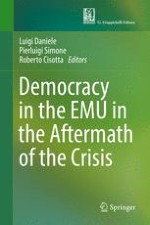2017 | OriginalPaper | Chapter
Does the Eurozone Need Its Own Parliament? Legal Necessity and Feasibility of a Eurozone Parliamentary Scrutiny
Author : Luca Lionello
Published in: Democracy in the EMU in the Aftermath of the Crisis
Publisher: Springer International Publishing
Activate our intelligent search to find suitable subject content or patents.
Select sections of text to find matching patents with Artificial Intelligence. powered by
Select sections of text to find additional relevant content using AI-assisted search. powered by
